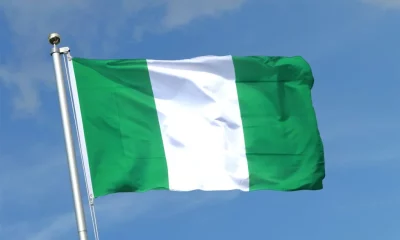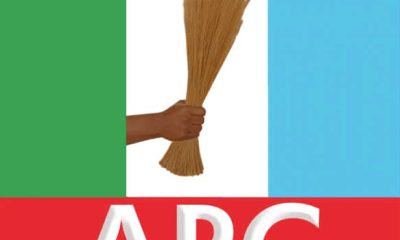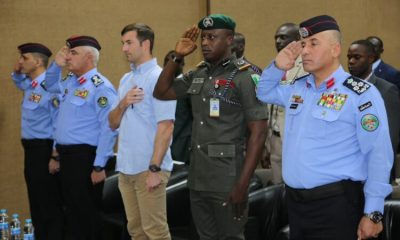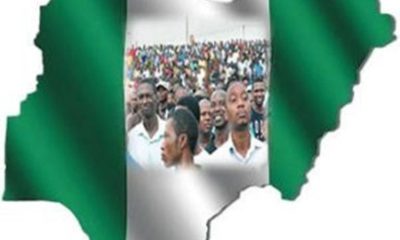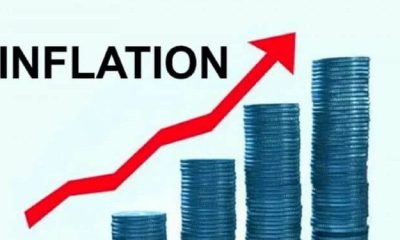columns
(TuesdayRapAround) Democracy In Nigeria: Certainly Not Yet Uhuru

Democracy In Nigeria: Certainly Not Yet Uhuru By Michael Ayotunde
(Too bad that Nigeria is practising democracy without true democrats. Everyone is busy scheming for oneself; where will of the majority has been supplanted.)
Democracy, the world’s most advanced, flexible system of governance, is no doubt, built on the equality of citizens irrespective of their economic, ethnic, religious and political affiliations.
It is anchored on freedom. That is, freedom of the people to associate with one another for the realization of most cherished ideals and the defense and promotion of certain interests that are germane and necessary for the survival of mankind, nay the society at large.
This freedom entails the right to choose between and among the various political platforms and candidates, and see to the actualization of the platforms’ goals and objectives.
Though not entirely flawless, most nations of the world have utilized this system to better their lots.
But in Nigeria, the situation is a different ball game.
The people have surreptitiously and effectively been disenfranchised by their own circumstances on the one hand, and the leaders’ perfidy on the other. As a result, Nigeria is approaching a situation where democracy is being practiced without democrats and elections are being conducted with scant regard for the electorate. The ballot is not respected by the government and the price of protecting it is too high for the people to pay; but the bullet, once universally feared, is now considered a necessary instrument.
Shedding of blood, too, now seems to be the order of the day. The sanctity of human life has been relegated to the background.
Thuggery is, thus the way to go. In the open, sponsors adorn white caftans, flowing gowns, but behind the scene, they are beasts; even with those who feign ignorance of it, but their foot soldiers carry out the devilish acts.
The law of the land is deliberately fashioned to provide soft landing for those who feed fat from the highly muddled situation. Good reasoning are never given deserved consideration. Nepotism is the order of the day. Mediocrity has taken the centre stage.
The nation’s ruling class, regrettably, has been more of calamity than success and blessing due largely to decrepit contribution to genuine and impactful governance. Over the years, failure to build strong and stable social system to provide the kind of atmosphere that democracy needs to take root and flourish, has been quite pathetic, to say the least.
Instead, what we see are eyesore, empty promises, propaganda in the face of hunger, policy summersaults, failure of governance, general insecurity and apparent lull in government activities. Only recently, officials of Borno State government were reported distributing shoe-shining materials, bags of fruits and other items to empower disadvantaged members of the public.
Such an open display of mediocrity is only a reflection of the thinking of the type of leaders people elect or select at any point in time to rule over them. These, of course, are the same set of people whose children attend the best schools in town, drove in best of cars, and with unbridled access to stupendous wealth.
Their strategy, of course, is to further impoverish the unsuspecting members of the public, by deliberately creating clandestine scenarios to show they actually have the people at heart. But in actual fact, they do that to subjugate people’s will to perpetrate themselves in office.
How will a nation move forward under this kind of insanity on the part of the ruling class?
The pomp and expectation that heralded the government of Mr. Muhammadu Buhari exactly three years ago, has died a natural death. What the government is left with is unbridled propaganda to launder its fast-fading image – all in an attempt to draw people to itself.
Unknown to them, this government’s greatest undoing was its resolve to consistently use the immediate past regime of the Peoples Democratic Party (PDP) as its benchmark. Why would a serious government that worth its sort, after condemning a government of lacklustre performance, corruption, and on attaining power now repeatedly based its performance on the same regime it has written off?
The present government ended up using three years of its first term blaming, comparing itself with the ousted regime. It is, no doubt, a sign of unseriousness, mediocrity, unpreparedness, show of cluelessness and lack of initiative to frontally launch the government to deliver.
Philip Bobbitt, in one of his famous publications, stated that, “it is the self-portrayal of a society that enables it to know its own identity. Without this knowledge a society cannot establish its rule by law because every system of laws depends on the continuity of legitimacy, which is an attribute of identity. Furthermore, without such a self-portrayal, no nation can pursue a rational strategy because it is the identity of the society that strategy seeks to promote, protect and preserve.”
From the foregoing, and looking at the year 2019 and beyond in the Nigerian political parlance, there are several vigorous challenges which must be met decisively and effectively if the polity is to endure.
The questions of national identity, national integration, the issue of strong individual/institution, the issues of the legitimacy of authority and the transformation of Nigerian society into a true political community have still not been properly and definitively addressed and a lot will depend on when and how quickly they are asked and answered.
Part of what we have seen lately include the arrogance of public servants to constituted authority. It is only in Nigeria that resolution of National Assembly can be trampled upon at will and pushed under carpet by a serving public officer and nothing happens afterwards. What kind of leadership is the nation providing then? Condoning outright truancy?
Immediately after 2015 elections, people talked about Buhari’s body language. Is it that same elusive body language that has emboldened the Inspector-General of Police, Mr. Ibrahim Idris, the Comptroller-General of Customs, Col Hameed Ali, to wilfully ignore resolutions of Nigeria’s Red Chamber – the Senate? What implications for the nation’s democracy?
Does Nigeria require strong, hardened individuals who are averse to democratic tenets to make her chosen system of governance work? Are not strong institutions far better than having strong-headed public officers? These and many more posers are begging for attention as Nigeria rolls out the drum to celebrate this year’s Democracy Day, today.
No disputing the fact that in Nigeria today, there is no blue-print to achieve resourceful economic management, broaden educational opportunity, food security, reduce absolute poverty, ensure security of lives and properties, promote real (not imagined) economic growth, fight corruption, provide employment and equal opportunities. Instead, treasuries are effortlessly and efficiently looted; people occupying responsible positions of authority demonstrate such lack of self control and inability to work with others as a team.
Nigeria is the only country in the planet earth that no impossibilities of contempt exist even in the most recent pot of absurdities – that is why, its citizens were rated the most happiest in the entire world and yet the most corrupt in the universe and the same reason is responsible for why the cries of marginalization and oppression are mere imitations of a smokescreen. No country without the rudiments of a rule of law like Nigeria would not be vulnerable to perfidies and incriminate hostage of power-mongers.
Why is the Nigerian polity so over-heated, and yet, it is apparently resilient? Could the Nigerian condition make a quantum transition to a worse condition? Or is there any need to change the status quo in contemporary Nigerian politics?
Are the rules of engagement in Nigerian politics overdue for drastic changes? How do we minimize the resultant entropy in the Nigerian political system? What are the most optimal and workable short-term solutions that can assure long-term resolution of Nigeria’s political dysfunction?
No doubt the nation’s political arena is getting hotter by the day. The PDP have had a fair share of it. APC on the other hand only had congresses few weeks ago and the various locations were apparently turned to battlefields.
Everyone was eager to get involved, yet people’s sufderings have remained the same.
It’s certainly not time for victory songs, sure there’s still enough battleground to cover.
-
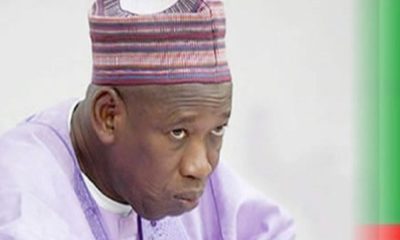
 News5 days ago
News5 days agoAPC National Chairman: Moves To Oust Ganduje Put Presidency In Quandary
-
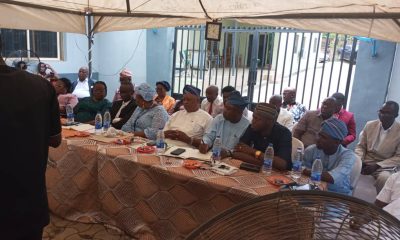
 News3 days ago
News3 days agoOsun RAAMP Opens Bid For Road Constructions Statewide
-

 News2 days ago
News2 days agoCapacity Building: OHIS Organizes Retreat For New Board Members
-

 News1 day ago
News1 day agoFamily Of Gruesomely Murdered Pastor Cries For Justice




